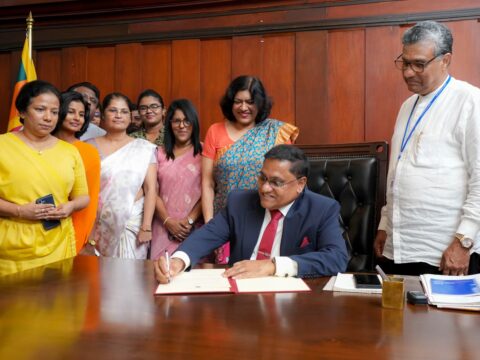© ASIAN NEWS INTERNATIONAL
As the political and economic upheaval in Sri Lanka continues, the average Sri Lankan believes that the current situation is largely due to self-serving politicians who have led them into this mess.
Sri Lanka’s multiple crises have been exacerbated by the COVID-19 pandemic which saw the collapse of the crucial tourism industry, which provides foreign currency for imported fuel and medical supplies, and rocked by the supply chain crisis precipitated by the Ukraine war.
Some 22 per cent of the population are food insecure and in need of assistance said the World Food Programme last month, and the UN has launched a joint Humanitarian Needs and Priorities Plan, requesting more than USD 47 million to aid around 1.7 million of the worst impacted.
This humanitarian crisis, said to have emanated from Sri Lanka’s current political instability, was a result of an economic collapse brought about by poor governance and bad policies, and getting Sri Lanka’s economy back on track requires urgent fiscal and economic policy reforms, which only a stable government can provide.
According to an Amsterdam-based think tank, people are of the view that the political class is responsible for the existing situation.
“At present, public distrust, indeed aversion, of the political class that the average Sri Lankan believes has been largely self-serving and has led them into this mess, combined with the absence of a trust-inspiring leader or political dispensation on the horizon, makes such a stable government appear like a distant wish to most Sri Lankans,” said think tank European Foundation for South Asian Studies (EFSAS).
Apart from the blame being attributed to the political class of the country, China’s role in providing unsustainable loans is also being scrutinized. Equally noteworthy is China’s absence from the stage at a time when Sri Lanka could do with its empathy and assistance the most has been as noteworthy as it is remarkable.
Neil DeVotta, professor of politics and international affairs at Wake Forest University, underlined China’s contribution to Sri Lanka’s current political and economic crisis. He described the island nation as a poster child of China’s debt-trap diplomacy.
“In the postwar period, Mahinda Rajapaksa (Gotabaya’s elder brother who was President from 2005 to 2015 and Prime Minister under Gotabaya), especially, embraced Chinese-funded white elephant projects. In doing so, his governments resorted to a debt rollover strategy, using foreign currency acquired via tourism and remittances to pay off interest on loans. When it needed more money, it borrowed more… At this juncture the issue is less about the amount owed to China and more about the ‘well-concealed’ nature of the loans and the extent to which they assisted kleptocracy,” DeVotta was quoted as saying by EFSAS.
He added, “India has led the way in trying to help Sri Lanka, contributing as much as $4 billion so far. China, too, has chipped in with currency swaps but is averse to restructuring Sri Lanka’s debts lest that encourage other states loaded with Chinese loans to demand similar treatment”.
According to the think tank, the public perception of Sri Lanka and elsewhere in the region has been in sharp contrast to that towards China.
Professor Harsh V. Pant, Vice-President of Studies and Foreign Policy at the New Delhi-based Observer Research Foundation (ORF) noted, “India has tried to fill the vacuum left behind by China and has provided essential relief to the country. There have been very high-profile acknowledgements in Sri Lanka of India’s assistance. This could bode well for India in the country in the future”




